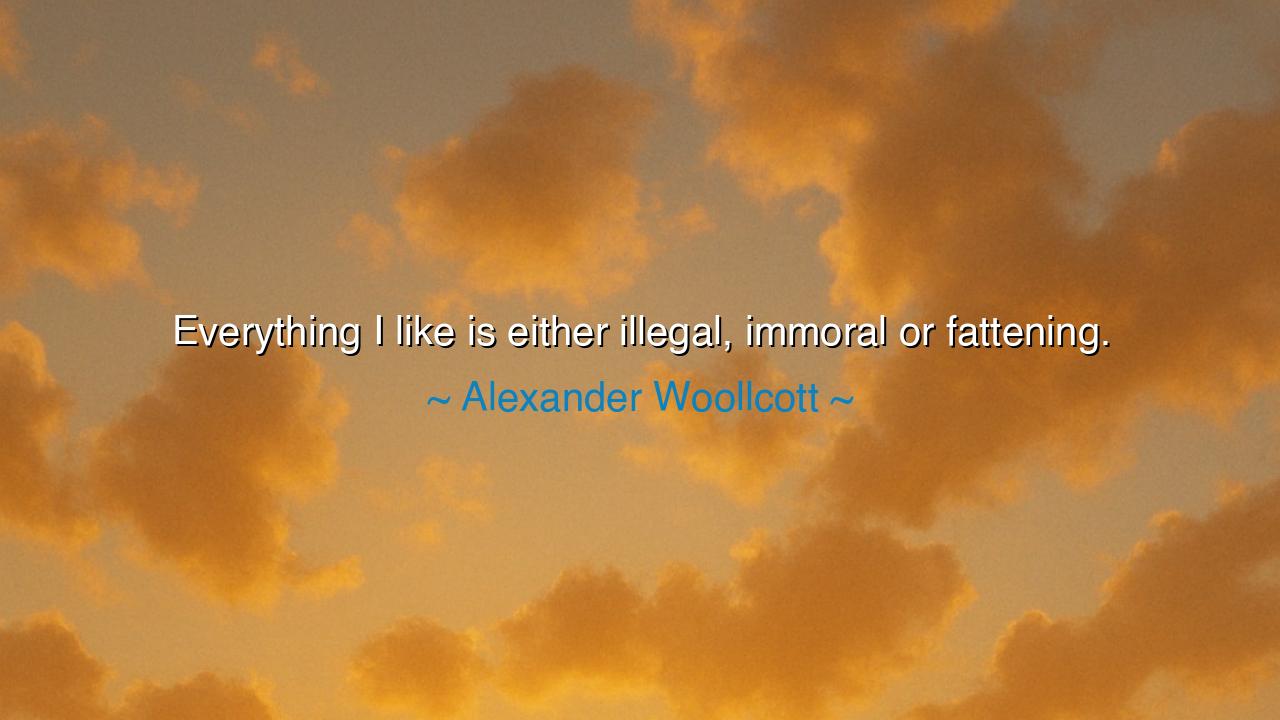
Everything I like is either illegal, immoral or fattening.






In the vast dance of human desire, there are moments when our inclinations clash with the rules and norms that govern society. Alexander Woollcott, in his characteristic wit and self-deprecating humor, captures this irony when he says, "Everything I like is either illegal, immoral, or fattening." These words, though spoken in jest, hold a profound truth about the nature of humanity—that our most cherished pleasures often come with consequences. From the rich indulgence of life’s forbidden joys to the comfort found in the unhealthy delights, Woollcott’s quote reflects our constant struggle between the things we crave and the constraints imposed upon us by society, morality, and health.
At the heart of this statement lies the timeless tension between desire and restriction. The ancient Greeks understood this struggle well. The philosopher Aristotle spoke often of the balance between pleasure and virtue, cautioning against the excesses of the flesh while recognizing that moderation could lead to fulfillment. Woollcott’s words echo this internal battle. Like the ancients, who celebrated the beauty of the body while also understanding its limits, Woollcott recognized that some pleasures—whether they be of the mind or the body—are often at odds with the ideals of society. To enjoy them fully, one must sometimes step beyond the confines of the law or the accepted norms of good behavior.
Consider the ancient Romans, whose love for indulgence was legendary. Seneca, the Stoic philosopher, warned that the pursuit of excess would lead to misery, for pleasures, especially those that gratify the senses, often have a price. Yet, the Romans indulged nonetheless, enjoying banquets that left them bloated and drunk with pleasure. Their enjoyment of life’s indulgences was often seen as reckless, as they sought comfort and escape in things that were, at times, destructive to their well-being. Woollcott’s remark is a modern reflection of this ancient contradiction—that to live fully, to embrace the pleasures of life, is to walk a tightrope between joy and consequence.
In the world of art, we find similar contradictions. Take, for example, the life of the great Vincent van Gogh, whose genius was fueled by his passion and intense emotions. His love for the vivid colors and emotional intensity of his paintings often came at the cost of his mental health and his stability. Van Gogh, like many great artists, struggled between his inner desires and the overwhelming consequences that came from them. His genius, while celebrated, was often fueled by the very things that were destructive to him. Similarly, Woollcott’s words express this tension—the things we love most are often those that bring us both delight and damage.
Yet, there is also a powerful lesson in Woollcott’s quote: the recognition that life’s pleasures, especially those that are forbidden, can be addictive. We are often drawn to that which we cannot have, to the desires that society tells us we should avoid. The temptations of the flesh, the rebellion against social norms, and the indulgence in luxury are not new struggles. Epicurus, the Greek philosopher, taught that pleasure was the highest good, but he also cautioned against indulgence that would lead to pain. For every pleasure we take, there is a balance to be struck between satisfaction and consequence.
In our modern world, we too must learn to balance our desires with wisdom. Woollcott’s words are a reminder that while indulgence is a part of the human experience, we must be mindful of the consequences that follow. The things we crave may not always be evil, but their excesses often bring unintended consequences. Alcohol, food, and social transgressions may offer temporary escape, but the price we pay—whether in health, reputation, or soul—often outweighs the short-lived satisfaction they provide. Balance, as the ancients understood, is the key: enjoy life’s pleasures, but never let them rule you.
The true wisdom of Woollcott’s quote lies in our acceptance of the tension between pleasure and restriction. We must learn to engage with life’s indulgences not as rebel but as wise stewards of our own desires. Rather than simply giving in to every craving, we must develop the discipline to enjoy what we love in a way that is moderate, thoughtful, and healthy. In doing so, we can avoid the addictive nature of indulgence and achieve a life that balances fulfillment with wisdom, knowing that while the pleasures of life are sweet, it is restraint that gives them meaning.






AAdministratorAdministrator
Welcome, honored guests. Please leave a comment, we will respond soon